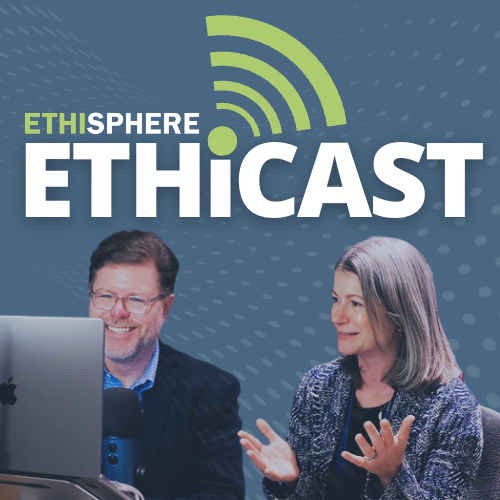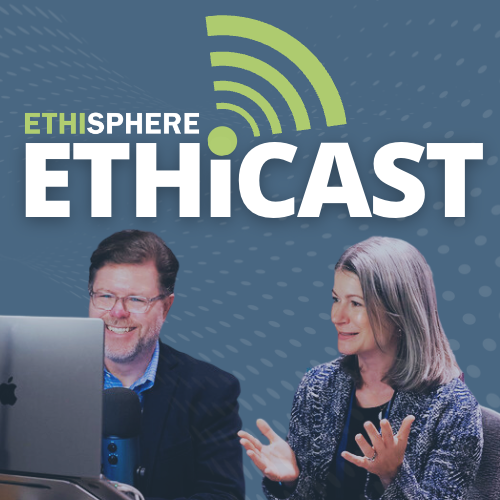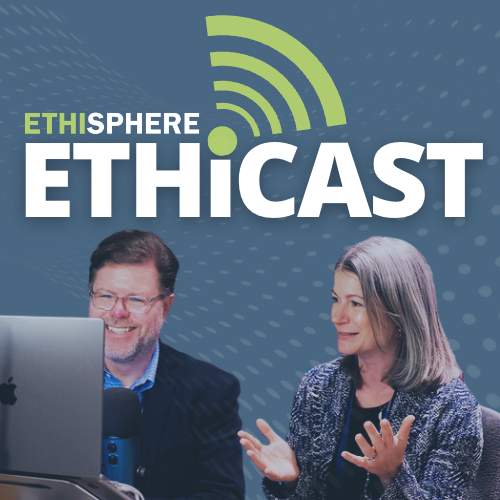[00:00:00] Speaker A: Hi everyone. Today we'll discuss the unique value that ethical leadership builds for organizations during these challenging and turbulent times. I'm your host, Bill Coffin and this is the Ethicast.
Ethical leadership drives tone at the top and directly embeds values of integrity and into the mission and vision of an organization. It is a huge component of business integrity, which as Ethisphere's most recent edition of the five year ethics Premium shows yet again is a deeply reliable metric for sustainable success.
But as we've seen from bruising proxy battles last year, to say nothing of large corporate rollbacks of their commitment to ethics and integrity based initiatives, now it is no longer enough to simply expect smart leaders to lead with values.
That case must be made at a time and in an environment that is no longer 100% receptive to it.
Returning to the Ethicast to talk about the inherent value of ethical leadership is Brian Peckrell, Executive director of The William G. McGowan Charitable Fund, a non profit organization that supports ethics based initiatives including the McGowan fellow program which supports ethical leadership among business school students and the Ethical Leader of the Year award. Brian, it is great to see you again. Thank you for coming back to the program.
[00:01:23] Speaker B: Bill, it's a pleasure to be back. Thank you for having me.
[00:01:26] Speaker A: Well, it is impossible not to notice that we are living in some interesting times when it comes to values based leadership. You have an interesting perspective given the work the McGowan foundation does. So tell me, are you seeing a broader retreat from values based leadership in the business world?
[00:01:42] Speaker B: Bill, that's a great question. You know, I'm not sure I would call it a retreat.
That said, there is definitely a true tension between short term economic pressures and long term values based commitments.
We are definitely seeing some organizations that are contending with this rapidly shifting perceived expectations.
I use the word perceived pretty intentionally there because in many cases the law has not necessarily changed.
Some organizations are definitely feeling compelled to put their core values on the sidelines in pursuit of immediate gains or appeasing some vocal critics.
I am definitely seeing some organizations that are transferring employees out of some functions or scrubbing parts of their website as some type of form of self compliance. That said, the reason I take exception with the word retreat, there are some organizations that are doubling down on pressures to keep their principles or get rid of their principles. Facing this, this, these challenges. They're taking a look at themselves and they're saying, hey, this is what we believe and we're doubling it. The reason for that I believe is they're taking A longer look. And they're seeing that if, if they do this in the long run, they'll build brands as being trusted and resilience and sticking true to their values. I think that if you take a snapshot of any moment in time, the data set is incomplete.
If we check back in six months, 12 months, where are we going to be? It's really difficult to say in this exact moment.
As an optimist, I'm feeling good that potentially there are organizations that are using this as a moment to look at their values, see what they believe.
And many organizations are going to realize that staying true to the course is the better decision for them, economically speaking.
[00:03:41] Speaker A: In our discussion before this recording began, you referenced Kohlberg's stage of moral development. Can you describe that for our audience and more importantly, how that informs the work that you do with business students who are just beginning their own professional journeys?
[00:03:54] Speaker B: Absolutely. So for some context, Lawrence Kohlberg is, was a professor of psychology at the University of Chicago in and he developed this framework for understanding moral development and ethical reasoning as a transformational entity where one moves through processes until they eventually reach some type of level of universal ethical principles.
Along that progression, individuals go from, you know, avoiding punishment and maximizing reward in their infant stages to looking for, for social acceptance in adhering to set laws, what we would probably call law and order, to eventually moving to a stage where they realize that cooperation has mutual benefit. And while Kohlberg set up this moral framework to understand how individuals move through this process towards ultimately understanding universal moral principles, what we would think of as human rights, freedom, liberty, it's also very helpful to understand organizations and leaders because they leverage these same levels of moral development and their own practices.
We have taken this tool and applied it to our fellows program. So for some context, the McGowan Fellows Program is a ethical leadership development initiative where we work with 10 business schools to take high achieving second year students to teach and train them in ethical leadership. So when they become business leaders, they don't just make great business decisions, but they do so in a way that positively affects people and society.
Core to our understanding is that challenging experiences, when supported through positive feedback and support, can lead to leadership development.
So we design challenging experiences in which our Fellows are able to reflect on their own leadership practice so that they can develop as leaders. Before the program, we asked them what are the principles that lead that you lead with? They come up with, you know, integrity, empathy, self awareness, courage. And through this experience, they're able to learn how to flex these virtues as a tool in their own leadership.
I think that this is very helpful so that when they go into business, you know, ethics are not just a checklist, but it's actually a tool that they can use to navigate complex real world scenarios.
Above all, I hope that our fellows are developing a system so that when they go into businesses, they can, despite what that business's orientation is, whether it's maximizing profit in the short term or turning at every whim that's going on in the market, that they are leading with principles like fairness, dignity and respect. And by doing so they're helping to establish a culture that's. It might sound cliche, is not focused on what I can get away with, but how do I do the right thing when no one is watching? And it's our opinion that by doing so they're setting businesses up for long term success.
[00:07:03] Speaker A: With the backlash against esg, proxy battles to instill activist directors on high profile companies, and a cessation of enforcement of some of our most important anti corruption laws, it's easy to feel overwhelmed by it all. What words of perspective could you share with the ethics and compliance professionals in our audience who might be wondering about the future of their discipline and the value it generates?
[00:07:26] Speaker B: I think that it dovetails with what we were just speaking with quite nicely.
To state the obvious, it seems that ethics and compliance are somewhat cyclical in nature. And by that what I mean is that public sentiment towards regulatory focus ebbs and flows. In my opinion, that's bad business. First and foremost. Changing how you regulate every 1, 2, 5 years is expensive to change your procedures, to change the function of people's jobs. But it's also a bad look. You know, doing the bare minimum instill does not instill confidence in your employees or your customers.
And I think it goes back to this notion of being, you know, kind of transactional or having sometimes like almost an antisocial approach to maximizing profit in minimizing everything else.
It's my belief that when organizations are committed to ethical principles over the long term, it sets them up to be resilient and more trusted. And when challenging times occur, there's real value, in my opinion, in having a culture of integrity and trust.
There's so many examples in the business world where this works out. One that like really comes to mind is Delta. A couple Years ago in 2023, we gave the Ethical Leader of the Year award to the CEO of Delta at Bastion. And we gave it to him because Delta really weathered the storm during the pandemic when There was a lot of fear and anxiety around flying. Delta took some real serious steps to protect their customers and to protect their employees. But the thing is, it didn't start in 2020 with Delta. It started in like the late 2000s when there were real financial issues. Delta understood that if they wanted to be a quality airline, they had to take care of their employees first and foremost. They set up processes and procedures then that made their employees trust their, their organization.
So when it came time to deal with the pandemic, the employees knew that they would protect them from the virus and that they would try to protect their health care. And that that cascaded down into the level of the customers and it led Delta to being a very profitable airline following a very difficult moment for them in 2022 or in 2020. Excuse me. So what I'm saying is that when there is uncertainty in the market, people, customers and employees, they look for consistency in organizations that stay true to their values, are able to establish a brand of trust that is consistent through the good times, in the poor times. And just to kind of put a bow on this, in a capitalist market like we have, you can kind of think of the economy like a democracy. People vote with their money.
And over the long term, if you're a trusted organization that takes care of the employees and the customers, you are going to be much better suited for success and win out. And I think when organizations are thinking about regulatory rollback, they should consider this. They should consider what their values are, their principles are, and set up institutions that are aligned with that in over 40 quarters. I think they'll be better suited.
[00:10:47] Speaker A: Final question. When is the Ethical Leader of the Year award being announced?
[00:10:51] Speaker B: Absolutely, I'm glad you asked. This year we'll be announcing the Ethical Leader of the year on June 30 at SHRM 25. That's the society for Human Resources Management Conference and Expo. It's in San Diego, California. We're looking forward to honoring a great winner this year. More details to come soon.
[00:11:10] Speaker A: Brian, thank you so very much for joining us and we hope to have you back on the program once again.
[00:11:15] Speaker B: It's my pleasure. I look forward to it.
[00:11:18] Speaker A: To learn more about the great work that Brian and his colleagues are doing at the William G. McGowan Charitable Fund, please visit williamgmgowanfund.org There you'll find additional details on the McGowan Fellows Program, the Ethical Leader of the Year Award and more.
For additional free resources on how to promote values based leadership and ethical culture within your organization, please visit the Ethisphere resource
[email protected] resources if you'd like to appear as a guest on the ethocast to share a best practice success story or your own proof point around how business integrity builds value, we would love to hear from you. Drop us a
[email protected] ethicast I'm Bill Coffin and this has been the Ethicast. For more content like this every week, please like and subscribe on YouTube, Apple Podcasts, and Spotify. Thanks for joining us, and until next time, remember, strong ethics is good business.


